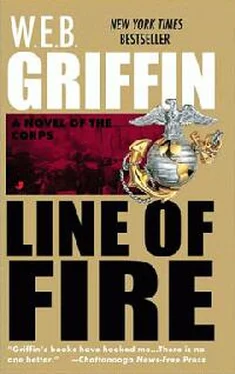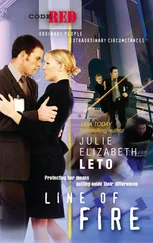W.E.B. Griffin - The Corps V - Line of Fire
Здесь есть возможность читать онлайн «W.E.B. Griffin - The Corps V - Line of Fire» весь текст электронной книги совершенно бесплатно (целиком полную версию без сокращений). В некоторых случаях можно слушать аудио, скачать через торрент в формате fb2 и присутствует краткое содержание. Жанр: prose_military, на английском языке. Описание произведения, (предисловие) а так же отзывы посетителей доступны на портале библиотеки ЛибКат.
- Название:The Corps V - Line of Fire
- Автор:
- Жанр:
- Год:неизвестен
- ISBN:нет данных
- Рейтинг книги:4 / 5. Голосов: 1
-
Избранное:Добавить в избранное
- Отзывы:
-
Ваша оценка:
- 80
- 1
- 2
- 3
- 4
- 5
The Corps V - Line of Fire: краткое содержание, описание и аннотация
Предлагаем к чтению аннотацию, описание, краткое содержание или предисловие (зависит от того, что написал сам автор книги «The Corps V - Line of Fire»). Если вы не нашли необходимую информацию о книге — напишите в комментариях, мы постараемся отыскать её.
The Corps V - Line of Fire — читать онлайн бесплатно полную книгу (весь текст) целиком
Ниже представлен текст книги, разбитый по страницам. Система сохранения места последней прочитанной страницы, позволяет с удобством читать онлайн бесплатно книгу «The Corps V - Line of Fire», без необходимости каждый раз заново искать на чём Вы остановились. Поставьте закладку, и сможете в любой момент перейти на страницу, на которой закончили чтение.
Интервал:
Закладка:
FOR THE COMMANDANT
HORACE W. T. FORREST
MAJOR GEN, USMC
ASSISTANT CHIEF OF STAFF, G2, USMC
TOP SECRET
Banning raised his eyes to Colonel Mitchell's.
"Yes, Sir," he said.
"I apparently overstepped my authority and responsibility as I understood it..." Mitchell said.
Jesus Christ, I actually feel sorry for him.
"... and if an apology is in order, Major, please consider one extended."
"No, Sir. No apology is required, Sir. They should have briefed you."
"Is that Commander Feldt in the car?"
"Yes, Sir."
"If you will give me that message back, I will show it to Commander Feldt and then see about getting back to Melbourne."
"Colonel," Banning said, "unless you have some pressing business in Melbourne, why don't you spend the night with us, and let us show you what we're doing here?"
"In light of that message, that strikes me as-"
"Sir, it was a question of Need to Know. With respect, Sir, you have not been cleared for what we're doing here."
"I have a TOP SECRET clearance," Mitchell said. "I'm the liaison officer between the two senior headquarters in the Pacific, and I'm the senior Marine officer present at SWPOA." Banning, aware that he was about to lose his temper, spoke very carefully.
"Colonel, you have two choices. You can get back on that airplane or you can spend the night with us, let us show you why this is all so important."
"You had something to do with that message I just got, didn't you, Major? It was not just a reply to my radio, was it?"
"Sir, when you told me what you wanted me to do, and I told you what you asked was impossible, and when I learned you had sent that radio, I sent a back-channel message-"
"Who told you about my radio? That Oriental cryptographer?"
"That Oriental cryptographer"? Fuck you, Asshole!
Banning came to attention.
"Sir, I will bring this message to Commander Feldt's attention and arrange to have the confirmation of its receipt radioed to General Forrest. Good afternoon, Sir." He saluted, and without waiting for it to be returned, executed a perfect about-face movement and then marched toward the Studebaker.
"Now see here, Banning!" Colonel Mitchell called after him.
Banning reached the Studebaker, got behind the wheel, and drove off.
"The Asshole, I gather, is not coming to tea?" Commander Feldt asked.
"Sod him," Major Banning said.
The story that ended with the arrival of Colonel Mitchell in Townsville had its start some months earlier with what Banning now recognized to be a hell of a smart idea on the part of Secretary of the Navy Frank Knox. At the beginning of the war, Knox realized that he was going to read very few honest reports on the functioning of Navy in the Pacific so long as those reports were written by Navy captains and admirals.
Knox concluded that if he was going to get anything like what he actually needed, he'd have to find someone who was not a member of the Navy establishment, yet who understood the Pacific and the Navy's responsibilities there. He found him, in spades, in the person of Captain Fleming W. Pickering. In addition to having been an any-tonnage, any-ocean master mariner (hence Captain) since he was twenty-six, Pickering was Chairman of the Board of Pacific and Far East Shipping Corporation.
Pickering, in other words, had all the necessary credentials that Knox required.
It is a sign of Frank Knox's considerable integrity that he actually chose Fleming Pickering for the job; for their initial encounter was not pleasant, Fleming Pickering being a notably outspoken man with very strong views indeed. They met in connection with Pickering's refusal to sell his forty-two-vessel cargo fleet to the Navy (he did sell the Navy his twelve-vessel passenger-liner fleet). During their meeting (it took place not long after the attack on Pearl Harbor), Pickering told Knox that he should have resigned after that fiasco, and they should have shot the admirals in charge.
Peace between the two was arranged by their mutual friend, Senator Richmond F. Fowler (R., Cal.), and Pickering was commissioned into the Navy as a Captain on Knox's personal staff. He left almost immediately for the Pacific, where he filed regular reports on what the Navy and Marine Corps were actually doing-as opposed to what they wanted Frank Knox to know about.
Unfettered by the restraints he would have endured had he been under the command of CINCPAC, and with a wide network of friends and acquaintances in Australia and elsewhere in the Far East, Pickering put his nose in wherever he wanted to.
Very soon after he learned of the Royal Australian Navy Coastwatcher Establishment, he realized its great intelligence value. And it didn't take Pickering long after that to realize that he and Lieutenant Commander Eric Feldt were both just about equally contemptuous of the brass hats the Navy sent to work with the Coast watchers.
As a result, a lengthy radio message from Pickering to Navy Secretary Knox resulted in the formation of Marine Corps Special Detachment 14, Major Edward S. Banning, commanding, under the Marine Corps Office of Management Analysis (its name was purposely obfuscatory). Banning's mission was not only to get along with Commander Feldt at any cost, but to provide him with whatever personnel, material , and money Feldt felt he could use.
Shortly after he took command of Special Detachment 14, Banning was made aware of one of the great secrets of the war, a secret that Pickering was also privy to.
Navy cryptographers at Pearl Harbor had broken many (but not all) of the codes of the Imperial Japanese General Staff.
Decoded intercepts of these messages were furnished to a very few senior officers (in SWPOA, for instance, only General MacArthur and his intelligence officer, Brigadier General Charles A. Willoughby, got them). The operation had its own security classification: TOP SECRET-MAGIC. And the only cryptographic officer at SWPOA (South West Pacific Ocean Area) cleared to decrypt MAGIC messages was a Ph.D. in mathematics from MIT, First Lieutenant Hon Song Do, Signal Corps, U.S. Army. Banning joined "Pluto" Hon on the MAGIC list, as a stand-in for Pickering.
Meanwhile, Fleming Pickering and Douglas MacArthur grew friendly-bearing in mind that to call any relationship with the General "friendly" might be stretching the truth. It was MacArthur's view (and Pickering agreed with him) that the Navy was telling him (like Frank Knox) only what it wanted him to know, and only when it wanted to tell him. As a result, a radio message brought the appointment of Marine Lieutenant Colonel George F. Dailey as liaison officer between CINCPAC and SWPOA, with orders to keep MacArthur as fully briefed as possible.
Dailey had a second function... though he wasn't aware of it. A former Naval attach‚, he had the security and intelligence background that would enable him, if necessary, to replace Banning as both Commanding Officer of USMC Special Detachment 14 and as Pickering's stand-in on the MAGIC list.
Since he had no Need to Know, he was told little about the Coastwatcher Establishment and nothing whatever of MAGIC-not even of its existence.
That issue became moot when the intelligence officer of the First Marine Division was killed in the opening days of the Guadalcanal operation. Officers at Headquarters USMC Personnel, unaware of Dailey's standby role as Banning's replacement, saw only a qualified replacement for the dead First Marine G-2. And so they ordered Dailey to Guadalcanal.
And either taking care of one of their own or (in Banning's judgment) getting rid of the sonofabitch-they ordered Colonel Lewis R. Mitchell to Australia to replace Lieutenant Colonel Dailey.
By the time Mitchell arrived, Captain Pickering had gone to Guadalcanal (where he figured he would be more useful than he was in Melbourne). With Pickering's departure Banning lost his own one-man-removed access to Navy Secretary Knox.
Читать дальшеИнтервал:
Закладка:
Похожие книги на «The Corps V - Line of Fire»
Представляем Вашему вниманию похожие книги на «The Corps V - Line of Fire» списком для выбора. Мы отобрали схожую по названию и смыслу литературу в надежде предоставить читателям больше вариантов отыскать новые, интересные, ещё непрочитанные произведения.
Обсуждение, отзывы о книге «The Corps V - Line of Fire» и просто собственные мнения читателей. Оставьте ваши комментарии, напишите, что Вы думаете о произведении, его смысле или главных героях. Укажите что конкретно понравилось, а что нет, и почему Вы так считаете.









